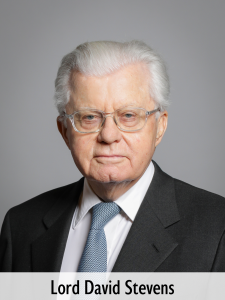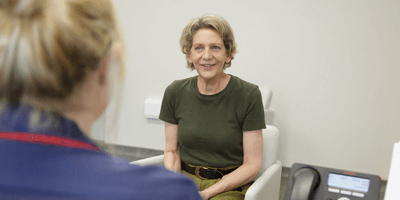Patient stories: Bringing vision up to par

Watching his golf shot sail into the distance is no longer a fleeting view for Lord David Stevens whose sight has been enhanced by procedures at King Edward VII’s Hospital.
The businessman and member of the House of Lords was struggling to see the ball from the tee and had to rely on a caddy to find stray shots after his sight deteriorated.
But the 85-year-old Conservative Independent Peer can now see with clarity after a period suffering from fuzzy vision caused by damaged cataracts.

“It was frustrating as I couldn’t see clearly and everything was what
they call custard-coloured. When I couldn’t see the golf ball,
I knew there was something wrong and that I needed an operation,
even though it was not going as far as before, ” he says.
“I consulted Ophthalmic Surgeon Danny Mitry and he agreed that my cataracts needed doing.”
Lord Stevens, the former chairman of United Newspapers, owner of Express newspapers, who was elevated to the Peerage by Margaret Thatcher, had operations on each eye, two weeks apart, performed under sedation to clear the cataracts and restore vision.
Mr Mitry is one of a group of world-leading consultants at King Edward VII’s Hospital, the independent charitable hospital with a unique heritage of Royal patronage, located in London’s Harley Street district.
“The entire experience was first class and it is a relief to be rid of that yellow hue to my vision and the restrictions it caused,” he adds. “It was all very efficient and prompt from the moment I arrived at reception.
“The King Edward VII’s Hospital staff were excellent and I was made to feel at ease throughout. The room was immaculate and the nurses were extremely good. I stayed for two hours post procedure and my prescription for eye drops was ready for me when I was ready to leave the hospital.
“Being able to see people, cars and buildings with clear definition when you are walking down the street is a pleasure. The deterioration in sight creeps up on you and eventually causes problems.”
Lord Stevens, a keen golfer, adds: “Before I could not see the ball much more than about 75 yards. I can now see the ball and where it goes. I don’t lose so many golf balls now!”
Surgeon Mr Mitry said: “Lord Stevens’ vision started to deteriorate subtly to the point where he couldn’t enjoy his hobbies and interests in the way he used to. The onset of cataract is typically gradual but can affect your vision in many ways. Although cataract surgery is a common day case procedure, knowing your patients visual needs is critical for the transformative results described by Lord Stevens. The surgery can transform vision and the lives of so many.”
More information
- If your vision is clouded or you think you have cataracts, you should consult your GP or optician. (Don’t have a GP?)
- If you are concerned about your eye health or have been advised that you have cataracts and need surgery, please do not hesitate to contact the team.
- King Edward VII’s Hospital ophthalmology department is here to help you.










